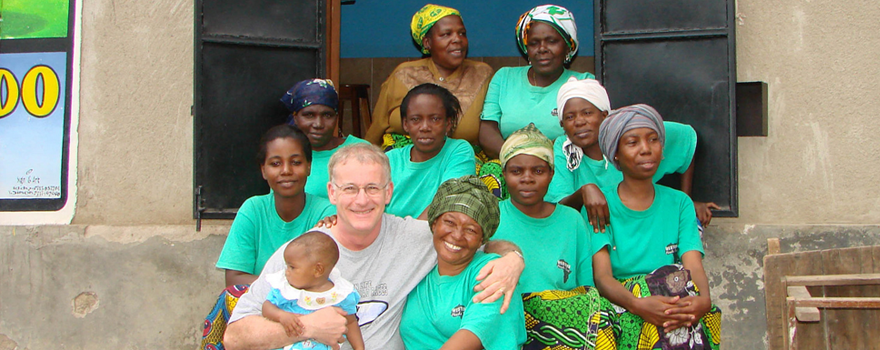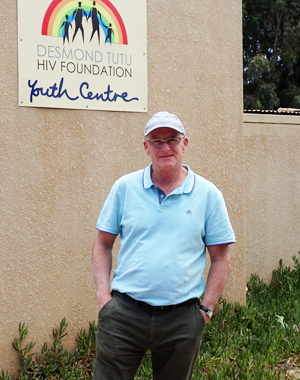World AIDS Day: Reflecting on a career of impact in probiotics research and community health
 Gregor Reid, PhD, helped launch Western Heads East, a community development project centred on probiotic yogurt social enterprises. Here, he poses with a local women's group ("Yogurt Mamas") who operate the probiotic yogurt kitchen in their community. (supplied photo)
Gregor Reid, PhD, helped launch Western Heads East, a community development project centred on probiotic yogurt social enterprises. Here, he poses with a local women's group ("Yogurt Mamas") who operate the probiotic yogurt kitchen in their community. (supplied photo)
By Cam Buchan
From pioneer and leader in probiotics research to crime-writing novelist, Gregor Reid, PhD, has certainly left an indelible mark on many fields during a career that has spanned more than 40 years.
Now, a new honour has been added to this impressive list that fits well with his life-long goal of making a global impact. The Gregor Reid Award for Outstanding Scholars in Developing Nations – established by the International Scientific Association for Probiotics and Prebiotics (ISAPP) – recognizes the founding board member and former president’s accomplishments, including passing on knowledge about probiotics and the human microbiome to low- and middle-income countries (LMICs) and the outreach achieved through Western Heads East (WHE).
As the world turns its attention to HIV/AIDS on World AIDS Day, we caught up with Reid, a Distinguished Professor Emeritus at Western University and Scientist at Lawson Health Research Institute. He talked about his career, the ground-breaking research and massive industry that emerged around probiotics, as well as the achievements of WHE and the activities of a certain investigative reporter named Barry Mackay.
What are some of the key moments in your career that you feel have made a difference?
I’ve always wanted to do research that made a difference to people and the planet. Hearing from patients everywhere, including those with HIV/AIDS, about the positive effects that probiotics have had on them has been a really amazing feeling.
The same is true of our efforts in Africa, where the WHE project that many of us were involved in has changed the lives of people quite significantly. Knowing your work has an impact like that is extremely gratifying.
Being the Chair of the WHO United Nations panel in 2001 that developed the definition of probiotics was also satisfying.
Western Heads East
A speech given 20 years ago by Stephen Lewis, UN Special Envoy for HIV/AIDS in Africa, inspired a group of Western staff and researchers to look for meaningful ways to help solve this global crisis. At the time, Reid was doing research on the benefits of probiotics and proposed that the group teach vulnerable populations in Africa how to make probiotic yogurt.
Reid, and a bioscience company based in Denmark, donated a probiotic strain, Lacticaseibacillus rhamnosus GR-1 to the idea and WHE was born. Last year, the program celebrated its 20th anniversary under the direction of Bob Gough, director of International Internships and Development.
Since the first yogurt kitchen was established in Tanzania in 2002, WHE and its collaborators have provided more than 150 student interns with opportunities to work in several countries to establish over 300 community kitchens, providing food to more than 280,000 people in East Africa. Along the way, the program has helped empower women to become financially independent and leaders in their community.
What are some of the student benefits of the Western Heads East program?
Students deserve a lot of the credit for working with local African communities and making the program a success. The purpose was to provide students with real-life experiences in low-income rural settings. By learning and giving of their talents, the internships really changed their lives.
Western Heads East is more than a humanitarian project. It provides a broad range of experiences for students – business, medicine, marketing, and the social aspects of it. The program also changes how interns look at life and view their potential to impact others through food and the value chain established around the probiotic yogurt. Very few, if any, universities have this sort of program.
 Gregor Reid, PhD, Distinguished Professor Emeritus (supplied photo)
Gregor Reid, PhD, Distinguished Professor Emeritus (supplied photo)
Describe your involvement in HIV/AIDS research in these low- to middle-income countries?
Through interactions with HIV/AIDS patients and caregivers, I came to see the disease as one with many aspects, and how malnutrition, poverty, violence against women, accessibility to care and lifestyle impacted its acquisition and management. It felt like we needed to take care of the person as a whole, as well as the society in which they lived, in order to prevent more suffering.
To that end, the probiotic yogurt can help alleviate diarrhea and fatigue, including symptoms associated with antiretroviral therapy (which blocks several stages of the HIV life cycle), and improve the immune response and patient stamina, as shown in studies I completed in Africa.
We were told by the women in the community kitchens that they had HIV/AIDS patients who could not walk and needed help climbing a few stairs. Within weeks of taking the probiotic yogurt, a number of patients were not only able to come up the stairs but were also able to contribute to their families and communities.
When you have people, especially women, set up small, successful businesses, they gain respect in the community and make money that can help their children gain access to better education and health care. There is no doubt that WHE contributed in tangible ways for the HIV/AIDS community.
Rewarding scholars in developing nations
The benefit of probiotics has been well documented, improving the health of everything from humans to honey bees.
Reid’s broad range of work was recently recognized by ISAPP with an award named in his honour that recognizes his academic legacy and the advancement of probiotic research, as well as his work in LMICs to address HIV/AIDS, general health, women’s empowerment and sustainable economic development.
Of the 54 countries he has given talks in, 17 were LMICs, illustrating his commitment to bringing this knowledge to the attention of people around the globe.
The ISAPP award has an international component to it. Why do you think that’s important to maintain?
The award encourages young researchers from LMICs in Africa and elsewhere to undertake research on this topic. This helps us better understand the challenges and opportunities faced by people in diverse parts of the world. It’s not just an award to send someone to a conference. It’s much more than that. I want the award to encourage young researchers to acquire the resources to propel their career.
It felt like we needed to take care of the person as a whole, as well as the society in which they lived, in order to prevent more suffering.
—Gregor Reid
I went from Scotland to New Zealand for my PhD studies and it was front page news in the local newspaper in 1978. I saw the world as my oyster, and I felt there was something in other places that I could learn. That three and a half years changed my life. On the way back to Scotland in 1982, I experienced Africa for the first time, by retracing my father’s roots in South Africa and visiting Nairobi. It touched me in ways I can’t describe. The ISAPP Award provides a means to keep connections open and give students an experience they won’t forget, just like my travels have given me.
With a career that has included more than 600 peer-reviewed publications, multiple awards and more than 60,000 citations, how are you keeping yourself busy in retirement?
I have a crime writing hobby. I write under the pseudonym of John G. Lesley. I thought if I put them under my own name, everyone would think the stories would be about probiotics. There are seven Barry Mackay novels altogether on Amazon.
Editor’s note: The fictional figure uncovers various injustices around the world – from animal and human trafficking to how powerful people believe they are better than anyone else. In addition, using his own name, Reid has written an Amazon Number One Hot New Release, “Probiotics: A Story About Hope”, which tells the story of how the probiotic field emerged, how the term is too often misused, and what lessons can be learned going forward.
I’m not totally out of science and still have a few papers to be published. I’ve also written a policy document for the Royal Society of Canada on how to incorporate microbes into planetary health and the ways Canada contribute to that initiative.
I feel truly blessed with what life has given me, and the many amazing people I’ve met along the way. Seeing the next generation forge ahead augurs well for the future.








